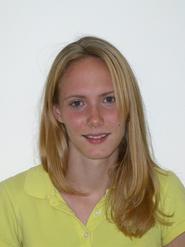
Victoria Jenkins '09 (Yonkers, N.Y.) was on campus this summer to study reverse micellar solutions in the lab of Assistant Professor of Chemistry Camille Jones. Jenkins was also involved in a larger project which deals with clathrate, or gas, hydrates. The lab had as a final goal the synthesis of a hydrate from a reverse micellar solution although the project was then split up so the component parts could be studied. Jenkins was studying the basic reverse micellar solution of isooctane, sodium docusate salt, and water in order to understand the fundamentals of water behavior in the solution.
A reverse micellar solution is a solution made of water dissolved into oil using a surfactant (which reduces the surface tension of water and makes the gas dissolve more easily); in other words, little spherical water droplets "get stuck" in the oil. This makes it easier to add gas under some conditions (usually high pressure and low temperature). The gas is then trapped in the water lattice, creating what is called a clathrate hydrate.
The project's larger aim is to find a way to store hydrogen in water and use it as a fuel. Officially titled "The Molecular Design Basis for Hydrogen Storage in Clathrate Hydrates," it is funded by a grant from the Department of Energy and researched by Hamilton, Tulane University, and Los Alamos National Laboratories.
Jenkins worked with the water in the reverse micellar. The hardest part of the project, she explained, was "narrowing in on a topic when the field is so large." She investigated a previous claim which states that there are several kinds of water present in the solution. Using FT-IR spectroscopy, Jenkins was able to conclude that there are three: trapped interfacial water at the surfactant layer, bound water at the oxygen in the surfactant, and bulk-like water inside the water pool of the droplet. Other researchers see six different kinds, others four. "It depends on the type of spectroscopy you're using," said Jenkins.
Having completed her first summer of research, Jenkins would like to return next summer. She is an undeclared neuroscience major and would like her next effort to be "hopefully in the Neuroscience Department," although "energy was a cool idea to work with this summer."
-- Lisbeth Redfield
Posted August 18, 2006
